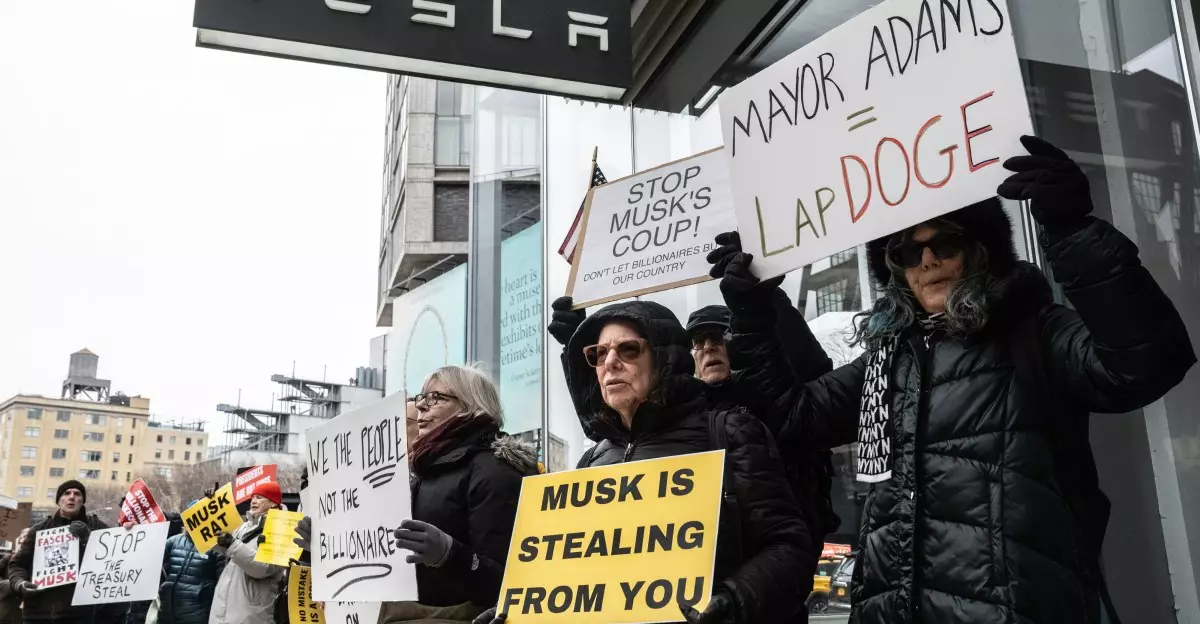In recent weeks, a wave of protests has swept across the United States, focusing on Tesla and its CEO, Elon Musk. The movement has largely been driven by individuals dissatisfied with Musk’s perceived political affiliations and the broader implications for Tesla’s reputation. This article delves into the motivations behind these protests, the response from the public and stakeholders, and the potential ramifications for both Musk and the company he leads.
This weekend marked the escalation of protests outside Tesla showrooms nationwide, evolving from a concept shared via social media into a visible reality. The trending hashtag #TeslaTakeover on platforms like Twitter and Bluesky has served as a rallying cry for protestors who accuse Musk of steering the company towards divisive political waters since Donald Trump assumed the presidency. While these gatherings might lack scale, they have proliferated in metropolitan areas like New York and even in smaller cities such as Golden Valley, Minnesota, highlighting a growing discontent with both Musk’s leadership and Tesla’s branding.
Videos from protests across various cities reveal a charged atmosphere, with participants chanting slogans expressing their disdain for what they describe as “swastikas on wheels.” These statements reflect deep-rooted fears about Musk’s associations with far-right groups, which many believe tarnish Tesla’s image. As the protests unfold, calls for Musk’s resignation from within Tesla staff have risen, with some claiming that the company might be better positioned without his controversial leadership. Tensions appear to be rising, illustrated by the juxtaposition of large, vocal crowds in cities like San Francisco against near-empty showrooms in others, such as Pittsburgh.
Concerns from Tesla investors have also come to the forefront. A recent report indicated that Tesla stock has plummeted nearly 21% since Trump’s inauguration, raising alarm bells about the implications of Musk’s political activities for the electric vehicle giant’s financial health. Investors are keenly aware of the potentially detrimental impact of a tarnished company reputation on sales and stock performance, especially as consumers increasingly resonate with broader social and ethical considerations in their purchasing habits.
Notably, high-profile figures such as actor Alex Winter have joined the fray, using their platforms to galvanize public sentiment against Tesla and Musk. Winter’s social media displays, including promotional images of himself protesting and encouraging others to divest from Tesla, help amplify the movement’s reach. Their involvement illustrates not only the discontent brewing within the political sphere but also the cultural narrative surrounding Tesla as emblematic of broader societal issues.
The protests extend beyond marching outside showrooms. Facing the issue head-on, celebrities like Sheryl Crow have leveraged their influence in creative ways—including symbolic acts of divesting from Tesla. Crow’s video of a Tesla being driven away on a flatbed truck underscores a significant turning point in how Tesla’s customer base perceives the brand. Individuals are increasingly ready to publicly distance themselves from Tesla due to leadership’s perceived ethical failings.
Looking ahead, the protests are poised to continue, especially with events planned for forthcoming holidays, suggesting a sustained effort to maintain public pressure on Tesla and Musk. The varied locales of these demonstrations—from Tennessee to Virginia—speak to a nationwide concern about not just the material impact of Musk’s beliefs on his corporation but also on social dynamics at large.
The protests erupting across Tesla showrooms highlight significant societal divisions and perceptions of corporate accountability. As the tumult surrounding Elon Musk deepens, so too does the dialogue about the responsibilities of leadership, corporate ethics, and consumer agency in the age of social media. Regardless of the protests’ immediate effects on Tesla, they signal an awakening, challenging both Musk and the electric vehicle industry to reconsider the broader implications of their actions on society. Whether this leads to substantial change within the company could depend on how effectively Musk addresses the criticisms levied against him and whether he can restore confidence among employees, investors, and consumers alike.

